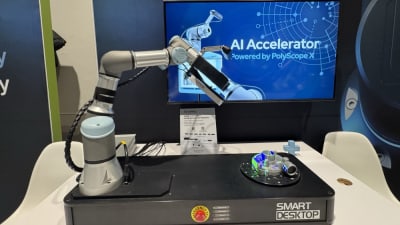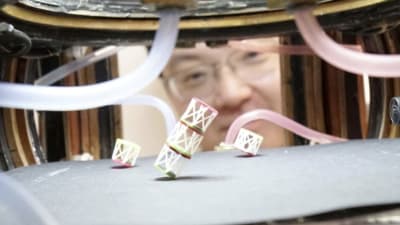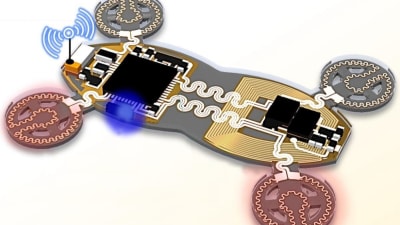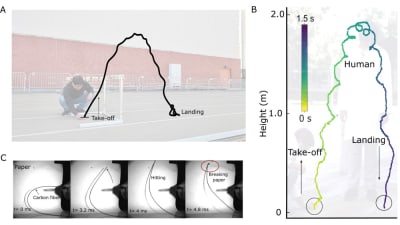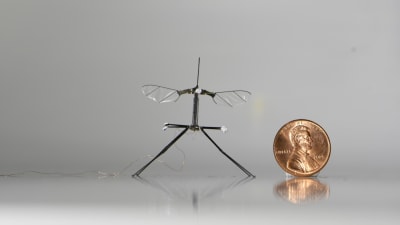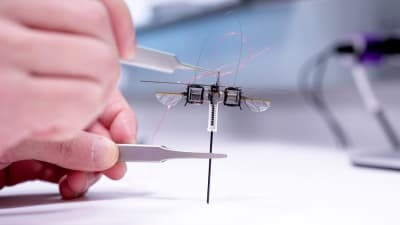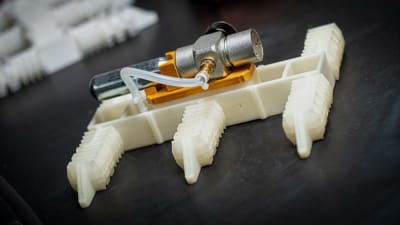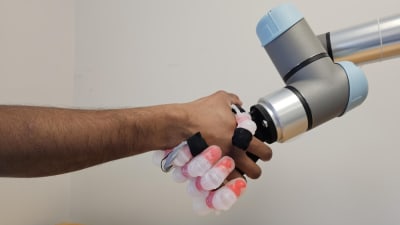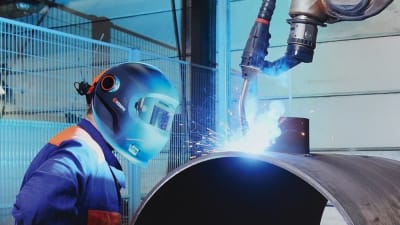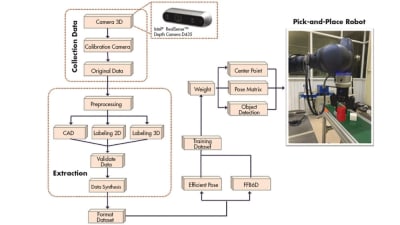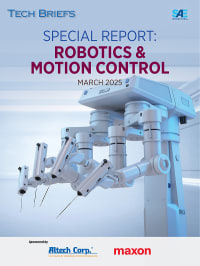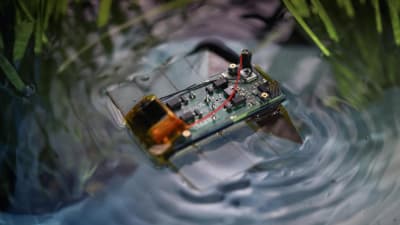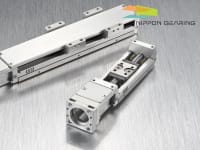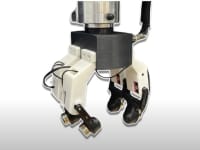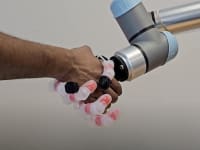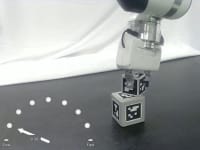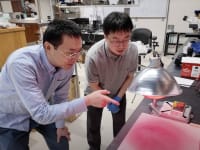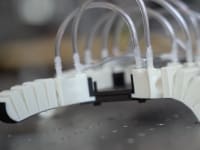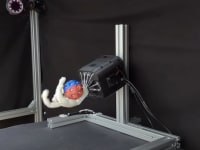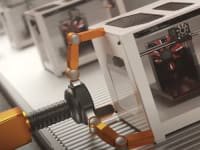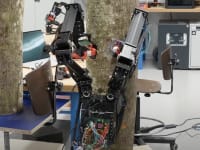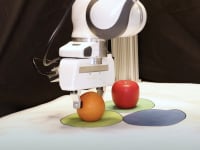Stories
51
167
61
0
150
30
INSIDER: Software
Montreal-based Vention, creator of the full-stack software and hardware automation platform, recently announced the commercial availability of its powerful...
Blog: Robotics, Automation & Control
While AI-driven robotics is driving greater efficiency and productivity, the manufacturing sector still faces several challenges that need to be addressed. How can manufacturers prepare for this new era of automation? Ujjwal Kumar, Group President, Teradyne Robotics, one of the keynote speakers at Automate 2025, shares his insights about the future of automation.
Blog: Mechanical & Fluid Systems
Engineers have created a type of material that can expand, assume new shapes, move, and follow electromagnetic commands like a remotely controlled robot even though it lacks any motor or internal gears.
Articles: Manufacturing & Prototyping
See the products of tomorrow, including seals that actively self-clean in a continuous or periodic manner; a method to grow artificial muscle tissue that twitches and flexes in multiple coordinated directions; and a compact and versatile robot that can maneuver through tight spaces and transport payloads much heavier than itself.
Blog: Motion Control
A tiny, soft, flexible robot that can crawl through earthquake rubble or travel inside the human body may seem like science fiction, but a team is pioneering such adaptable robots by integrating flexible electronics with magnetically controlled motion.
INSIDER: Medical
A tiny, soft, flexible robot that can crawl through earthquake rubble to find trapped victims or travel inside the human body to deliver medicine may seem like science fiction, but an...
INSIDER: Design
Inspired by the movements of a tiny parasitic worm, Georgia Tech engineers have created a 5-inch soft robot that can jump as high as a basketball hoop. Their device, a silicone...
INSIDER: Propulsion
The Harvard RoboBee has long shown it can fly, dive, and hover like a real insect. But what good is the miracle of flight without a safe way to land? A storied engineering achievement by the Harvard...
Blog: Design
The hopping robot, which is smaller than a human thumb and weighs less than a paperclip, has a springy leg that propels it off the ground and four flapping-wing modules that give it lift and control its orientation.
Blog: Design
Imagine a robot that can walk, without electronics, and only with the addition of a cartridge of compressed gas, right off the 3D-printer. It can also be printed in one go, from one material. That is exactly what roboticists have achieved in robots developed at the University of California San Diego.
Blog: Robotics, Automation & Control
Johns Hopkins University engineers have developed a pioneering prosthetic hand that can grip plush toys, water bottles, and other everyday objects like a human, carefully conforming and adjusting its grasp to avoid damaging or mishandling whatever it holds.
5 Ws: Motion Control
GOAT (Good Over All Terrains), a bioinspired robot developed at EPFL, can change shape to alter its own physical properties in response to its environment, resulting in a robust and efficient autonomous vehicle.
Application Briefs: Robotics, Automation & Control
Los Angeles-based plastics contract manufacturer Kal Plastics deployed UR10e trimming cobot for a fraction of the cost and lead time of a CNC machine, cut trimming time nearly in half, and reduced late shipments to under one percent — all while improving employee safety and growth opportunities. Read on to learn more.
Articles: Robotics, Automation & Control
Despite their immense potential, humanoid robots face several challenges before they can achieve mainstream adoption. In this article, two industry executives — Melonee Wise, Chief Product Officer of Agility Robotics and Barry Phillips, Chief Commercial Officer of Apptronik — share their insights about the current state and future outlook for humanoid robots.
Briefs: Robotics, Automation & Control
Researchers at Universidad Carlos III de Madrid have developed a new soft joint model for robots with an asymmetrical triangular structure and an extremely thin central column. This breakthrough, recently patented, allows for versatility of movement, adaptability and safety, and will have a major impact in the field of robotics. Read on to learn more.
Application Briefs: Robotics, Automation & Control
Mesekon Oy, a Finnish welding manufacturer that produces complex welded steel structures for the marine, energy, and paper industries, needed a flexible and collaborative solution to improve efficiency, reduce defects, and enhance workplace ergonomics by automating repetitive and physically demanding welding operations. Read on to learn what Mesekon Oy did.
Briefs: Software
A team of MIT engineers has developed a training method for multiagent systems that can guarantee their safe operation in crowded environments. Read on to learn more about it.
Briefs: Robotics, Automation & Control
A new study, published in the journal Results in Engineering, introduced a meticulously designed dataset aimed at enhancing the performance of 6D pose estimation algorithms. Read on to learn more.
Briefs: Sensors/Data Acquisition
Scientists have developed multi-modal 3D object detection methods that combine 3D LiDAR data with 2D RGB images taken by standard cameras. While the fusion of 2D images and 3D LiDAR data leads to more accurate 3D detection results, it still faces its own set of challenges, with accurate detection of small objects remaining difficult. Read on to learn more about it.
INSIDER: Unmanned Systems
A Ballbot is a unique kind of robot with great mobility, which possesses the ability to go in all directions. Obviously, controlling such a robotic device must be tricky. Indeed, ballbot systems...
Special Reports: Manufacturing & Prototyping
Robotics & Motion Control - March 2025
From the operating room to the family farm to your next hotel stay, advances in robotics and automation are impacting a wide range of industries. Read all about it in this compendium of articles from the...Blog: Physical Sciences
A team has developed a method to grow artificial muscle tissue that twitches and flexes in multiple coordinated directions. As a demonstration, they grew an artificial, muscle-powered structure that pulls both concentrically and radially.
Quiz: Physical Sciences
How much do you know about animal-inspired technology? Test your knowledge with this quiz.
Q&A: Design
Duke University Professor Boyuan Chen and his team have developed a platform called CREW that is used to create algorithms to optimize human-AI cooperation.
Blog: Design
Researchers at EPFL and the Max Planck Institute for Intelligent Systems have developed a compact and versatile robot that can maneuver through tight spaces and transport payloads much heavier than itself.
Technology & Society: Robotics, Automation & Control
A team of engineers is on a mission to redefine mobility by providing innovative wearable solutions to physical therapists, orthotic and prosthetic professionals, and individuals experiencing walking impairment and disability.
INSIDER: Propulsion
Springtails, small bugs often found crawling through leaf litter and garden soil, are expert jumpers. Inspired by these hopping hexapods, roboticists in the Harvard John A. Paulson School of Engineering and...
INSIDER: Sensors/Data Acquisition
From mountain goats that run up near-vertical rock faces to armadillos that roll into a protective ball, animals have evolved to adapt effortlessly to changes in their environment....
INSIDER: AR/AI
A researcher from Carnegie Mellon University’s School of Computer Science is using robotics to improve e-waste recycling.
Top Stories
Blog: Lighting
A Stretchable OLED that Can Maintain Most of Its Luminescence
News: Energy
INSIDER: Energy
Advancing All-Solid-State Batteries
Blog: Energy
My Opinion: We Need More Power Soon — Is Nuclear the Answer?
Blog: Robotics, Automation & Control
Aerial Microrobots That Can Match a Bumblebee's Speed
Blog: Communications
Microscopic Swimming Machines that Can Sense, Respond to Surroundings
Webcasts
 Upcoming Webinars: Electronics & Computers
Upcoming Webinars: Electronics & Computers
Advantages of Smart Power Distribution Unit Design for Automotive...
 Upcoming Webinars: Unmanned Systems
Upcoming Webinars: Unmanned Systems
Quiet, Please: NVH Improvement Opportunities in the Early Design...
 Upcoming Webinars: AR/AI
Upcoming Webinars: AR/AI
From Spreadsheets to Insights: Fast Data Analysis Without Complex...
 Upcoming Webinars: Defense
Upcoming Webinars: Defense
Cooling a New Generation of Aerospace and Defense Embedded...
 Upcoming Webinars: Test & Measurement
Upcoming Webinars: Test & Measurement
Beyond AI-Copy-Paste Engineering: Advanced AI-Integration Success...



